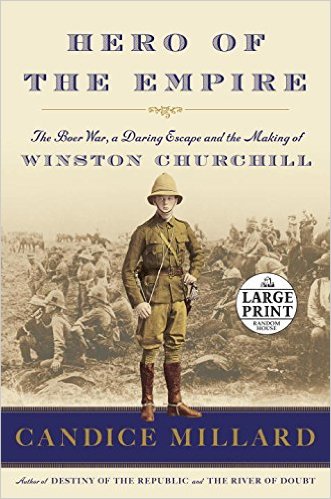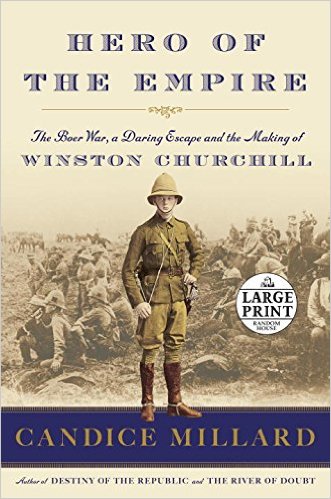
Finest Hour 174
Books, Arts, & Curiosities – The Birth of a Legend

December 30, 2016
Finest Hour 174, Autumn 2016
Page 42
Candice Millard, Hero of the Empire: The Boer War, a Daring Escape, and the Making of Winston Churchill, Doubleday, 2016, 400 pages, $30. 978–0385535731
Review by Con Coughlin
Con Coughlin is the author of Churchill’s First War (2013).

2025 International Churchill Conference
 When the young Winston Churchill set off to cover the Boer War as a newspaper correspondent in 1899, his overriding ambition was to make a name for himself. Aged just twenty-four, Churchill had already risked life and limb on two previous occasions in his bid to win public acclaim serving as an officer with the British Army in India and Sudan. But it was not until he travelled to South Africa as a war correspondent for London’s Morning Post that his heroic exploits succeeded in making him a household name. And it was as a direct result of this experience that his was able to fulfil his ultimate ambition—to win election as a Member of Parliament.
When the young Winston Churchill set off to cover the Boer War as a newspaper correspondent in 1899, his overriding ambition was to make a name for himself. Aged just twenty-four, Churchill had already risked life and limb on two previous occasions in his bid to win public acclaim serving as an officer with the British Army in India and Sudan. But it was not until he travelled to South Africa as a war correspondent for London’s Morning Post that his heroic exploits succeeded in making him a household name. And it was as a direct result of this experience that his was able to fulfil his ultimate ambition—to win election as a Member of Parliament.
The three-year conflict between Britain and the Boers was brutal and bloody, with heavy casualties suffered on both sides. But, as Candice Millard explains in her well-researched and highly-readable account of Churchill’s exploits in South Africa, Hero of the Empire: The Boer War, a Daring Escape and the Making of Winston Churchill, young Winston could not wait to get to the centre of the action.
But Churchill’s high hopes for his assignment were thwarted soon after he arrived in South Africa when he suffered the indignity of being captured and taken into captivity. This major setback occurred when the armoured train Churchill was travelling on suddenly came under attack by a well-organised group of Boer guerrillas. After the train was brought to a shuddering halt, Churchill displayed enormous bravery in his efforts to rally the British force to defend their positions.
His heroic efforts, though, were in vain, as it soon became clear the beleaguered British group was no match for the superior Boer force, and—to Churchill’s horror—the white flags of surrender began to appear among the British positions. As Millard explains, Churchill had already complained bitterly about the willingness of the British to lay down arms, writing to a friend that “there has been a great deal too much surrendering in this war.” Yet when Churchill found himself unarmed and surrounded by the Boers, he had no option but to follow the others into captivity.
Millard relates how Churchill was deeply depressed by the experience, believing he had “cut myself out of the whole of this exciting war with all its boundless possibilities of adventure and advancement.” And after he and the other prisoners had been taken to a makeshift camp in Pretoria, he resolved to make good his escape, which he accomplished by climbing through a lavatory window and then scrambling over the perimeter fence. Once free, he then hitched a ride on a coal train and, with the help of pro-British sympathisers, made his way to friendly territory on the coast.
While it may not have been the kind of experience he had anticipated when he first arrived in South Africa, the story of Churchill’s capture and escape from the Boers catapulted him into the public eye and made him a household name. And it was as a direct result of his daring-do in South Africa that Churchill was able to achieve his lifetime ambition of being elected to parliament when, the following year, he was elected MP for the northern seat of Oldham. A legend was born.
Subscribe
WANT MORE?
Get the Churchill Bulletin delivered to your inbox once a month.



